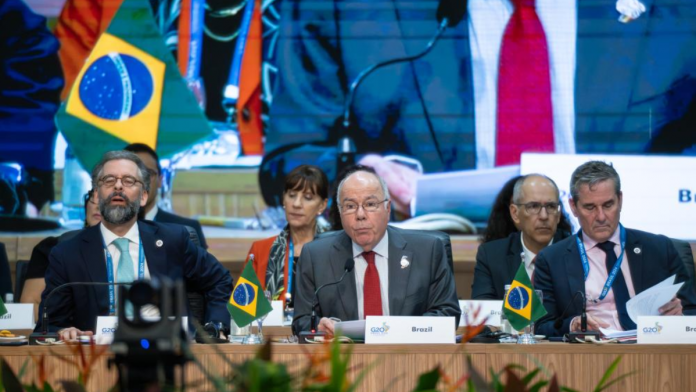News in brief:
– FAO Director-General emphasises peace, right to food, and global governance reforms at G20, urging action for better food security globally.
– Brazil’s G20 presidency takes a lead against hunger, with FAO supporting initiatives for efficient agrifood systems, market transparency, and resilience.
At the recent G20 Foreign Affairs Ministers Meeting in Brazil, QU Dongyu, Director-General of the Food and Agriculture Organization (FAO), stressed the critical need for peace, recognition of the right to food, and reforms in global governance.
With global conflicts and tensions escalating, Qu emphasised the necessity for prioritising actions that advance food security worldwide, encapsulated in the concept of the Four Betters: better production, better nutrition, a better environment, and a better life for all.
The meeting convened ministers representing 85% of global GDP, 75% of world trade, and two-thirds of the world’s population. The FAO Director-General praised Brazil’s initiative to establish a Global Alliance Against Hunger and Poverty. Rising food and energy prices, exacerbated by the COVID-19 pandemic and conflicts, have impacted food security globally.
Global challenges and FAO’s role in addressing crisis
Rising food and energy prices compounded by the aftermath of the COVID-19 pandemic and natural disasters have exacerbated food insecurity, affecting not only traditional hunger hotspots but also communities worldwide, including local farmers. The FAO underscored the urgency of increased investment in transforming agrifood systems to enhance efficiency, inclusivity, resilience, and sustainability.
FAO’s multifaceted approach involves tackling acute hunger, strengthening agricultural markets, and enhancing resilience among member states and their populations. Through initiatives like the Integrated Food Security Classification and the Agricultural Market Information System, FAO provides vital support in mapping hunger crises and stabilising agricultural markets, crucial for ensuring food security.
Building resilience and fostering collaboration
Qu highlighted FAO’s commitment to enhancing members’ resilience, particularly among vulnerable groups such as women, youth, and rural farmers. By advocating for increased incomes, better infrastructure, and access to education and health services, FAO aims to uplift communities and mitigate the impact of crises.
FAO stands in solidarity with UN Secretary-General António Guterres’s call for revitalizing global governance institutions to meet the challenges of the 21st century. With a collaborative approach involving governments, civil society, the private sector, and other stakeholders, FAO seeks to foster dialogue, exchange knowledge, and drive meaningful change.



